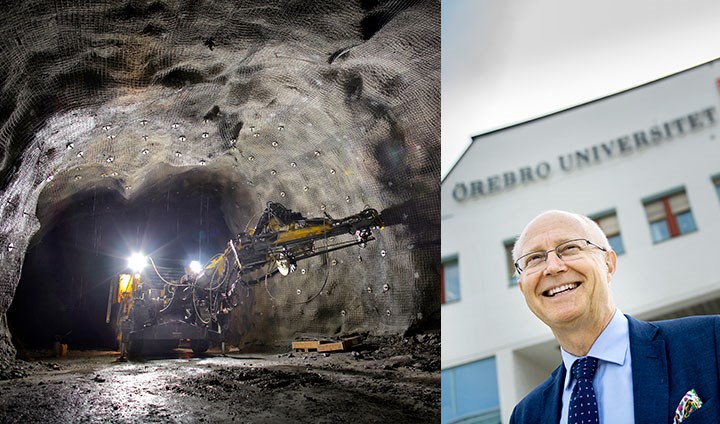Örebro is part of multi-million investment in mining research: “to set new world standard”

For the mining industry to achieve its goal of being digitised, automated and carbon dioxide-free, more research and development is needed in AI and robotics. Örebro University researchers will contribute their expertise in these areas to LKAB’s multi-million investment towards sustainable mining of the future.
LKAB is investing SEK 80 million in research towards sustainable mining. Örebro University, with its expertise in AI and autonomous systems, is one of three universities whose researchers will contribute to the development.
“We see the mining industry as an expanding area for AI and robotics,” says Vice-Chancellor Johan Schnürer.
The mining industry plays a vital role in both Sweden and the world, including efforts towards a fossil-free future. The electrification of vehicle fleets, for example, requires batteries. Producing them requires a range of metals and minerals, such as cobalt, lithium and graphite.
However, the growing demand for mining requires that the mining industry become more sustainable, safe and climate efficient. LKAB’s vision is to complete its transition to carbon dioxide-free processes and products by 2045. To achieve this, the company is investing SEK 80 million in a multi-year research collaboration with Örebro University, Luleå University of Technology and Mälardalen University. Örebro University’s share is SEK 7.6 million, which will finance three postdoctoral researchers over two years.
“The initiative supports our strategy to set a new world standard for mining,” says Jordi Puig, Head of Mining Technology at LKAB.
“An opportunity to further develop our research”
“LKAB’s initiative represents a fantastic opportunity for Örebro University,” says Vice-Chancellor Johan Schnürer.
“We are very excited to be a part of this collaboration. AI and robotics are one of Örebro University’s strongest research areas, and LKAB’s initiative allows us to develop our research further while at the same time promoting our further collaboration with industries and academic partners. Together with our long-standing collaboration with Epiroc, this represents a strategic investment in the mining industry that we see as an expanding area for AI and robotics,” says Johan Schnürer.
The research assignments will commence immediately and continue until the end of 2024. The research will be conducted mainly within underground transportation, energy efficiency, and risk management for increased safety awareness.
Örebro researchers to examine risk management and mixed traffic in mines
Örebro University is participating in at least two subprojects. Led by Professor Franziska Klügl and Associate Professor Federico Pecora, one subproject focuses on mixed traffic in mines – when autonomous vehicles traffic the same space as human-driven vehicles. The second sub-project concerns risk management and is led by Professor Achim Lilienthal together with researchers from Mälardalen University.
“We’re excited to collaborate with LKAB. As a researcher, there are many interesting challenges to consider regarding large-scale, modern mining. I’m looking forward to working with Federico Pecora on designing new ways of managing underground traffic control. It will enable people and automated fleets to coordinate their traffic patterns and activities,” says Franziska Klügl.
LKAB’s is confident that these research projects will also result in increased knowledge sharing so that other interested parties will also benefit from these developments.
“Research findings will be shared ‘open source’ with our partners ABB, Combitech, Epiroc and Sandvik and eventually also with other companies,” says Jordi Puig at LKAB.
Text: Jesper Eriksson
Photo: Örebro University and Fredric Alm/Alm &ME
Translation: Jerry Gray
